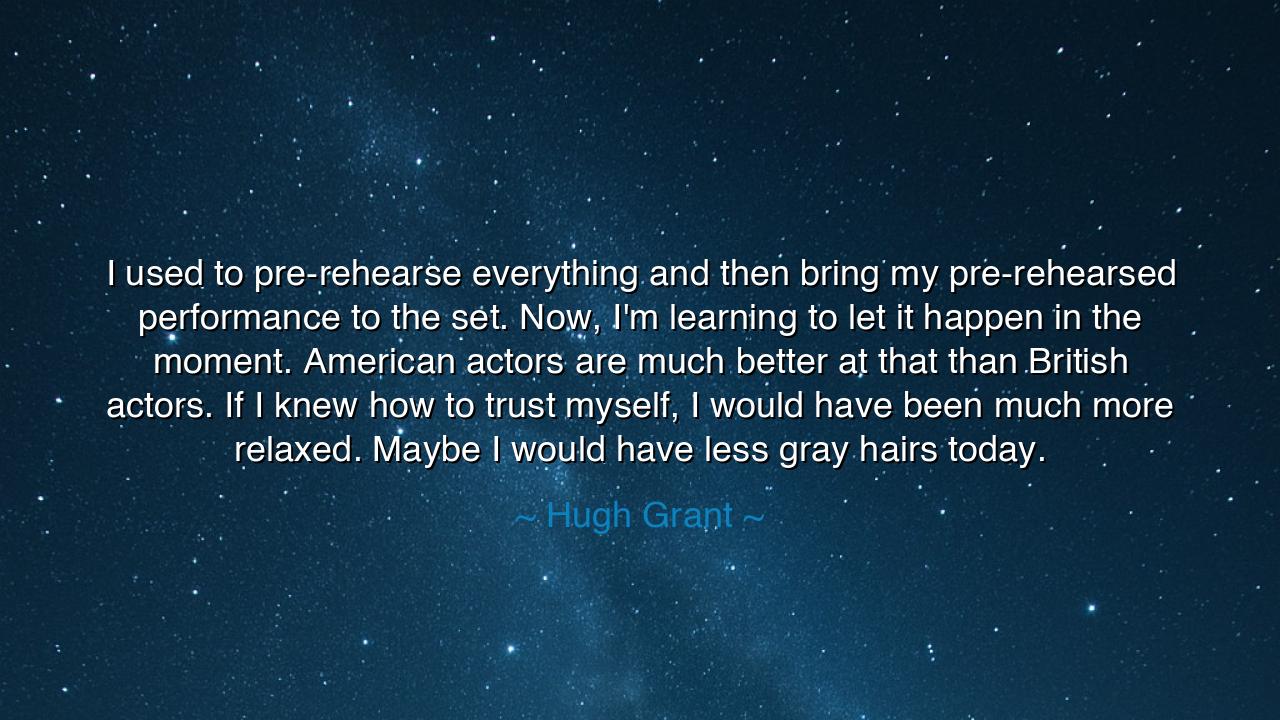
I used to pre-rehearse everything and then bring my pre-rehearsed
I used to pre-rehearse everything and then bring my pre-rehearsed performance to the set. Now, I'm learning to let it happen in the moment. American actors are much better at that than British actors. If I knew how to trust myself, I would have been much more relaxed. Maybe I would have less gray hairs today.






“I used to pre-rehearse everything and then bring my pre-rehearsed performance to the set. Now, I’m learning to let it happen in the moment. American actors are much better at that than British actors. If I knew how to trust myself, I would have been much more relaxed. Maybe I would have less gray hairs today.” — Hugh Grant
In these words, Hugh Grant, the eloquent and self-aware craftsman of his art, speaks to a universal struggle within the human heart — the tension between control and trust, between perfection and presence. His confession transcends the world of acting and becomes a meditation on life itself. For what is performance but a mirror of existence? We, too, rehearse our lives endlessly — planning what to say, what to do, how to appear — and yet, in doing so, we often lose the living essence of the moment. Grant’s words remind us that freedom and authenticity arise not from control, but from confidence in oneself and faith in the unpredictable beauty of spontaneity.
The origin of this reflection lies in Grant’s long career on the stage and screen, where the British tradition of precision and formality often contrasts with the American emphasis on instinct and emotional fluidity. He admits that for many years, he approached his craft as a scholar approaches a formula — rehearsing, refining, and sculpting his performance until it gleamed with technical perfection. Yet, with time, he discovered that art — like life — cannot be fully mastered by intellect alone. To act truly, one must trust one’s impulses, surrender to the living current of the scene, and allow truth to emerge naturally. Grant’s lesson is the wisdom of one who has wrestled with his own need for control and learned, at last, the grace of letting go.
The ancients knew this truth well. In the teachings of the philosopher Lao Tzu, it is written: “When I let go of what I am, I become what I might be.” The wise of old understood that mastery is not rigidity, but flow — that the archer’s arrow flies truest not when his arm is tense, but when his spirit is calm. So it is with the artist, the leader, the lover, and the seeker. When one clings too tightly to control, fear takes root. But when one learns to trust, creativity, grace, and joy return. Hugh Grant’s evolution from pre-rehearsed precision to organic spontaneity is the same journey walked by sages and craftsmen throughout the ages — the path from the anxious mind to the liberated heart.
Consider the example of Mikhail Baryshnikov, the great ballet dancer who mastered the most disciplined form of movement, yet ultimately sought liberation beyond it. Having trained in the Soviet system, where every motion was dictated, he later said that true artistry began only when he stopped dancing for perfection and started dancing for life. He, like Grant, found that discipline is only the foundation — it is trust, feeling, and presence that transform skill into art. His movements, though seemingly effortless, carried the depth of one who had learned to listen — to his body, to the music, and to the moment itself.
Grant’s self-reflection also holds a quiet humility — the awareness that his earlier desire to control was born of fear, not arrogance. He admits, almost wistfully, that if he had trusted himself sooner, he would have lived with more ease, with fewer gray hairs, and greater joy. This vulnerability is itself a kind of wisdom, for it speaks to the cost of overthinking — the years we spend striving for certainty when what we need is courage. The American actors he admires have simply learned to leap without knowing where they will land, to discover truth through doing rather than planning. They are not fearless; they have simply made peace with imperfection.
There is a deep lesson in his words for all who labor under the weight of their own expectations. Perfectionism, though noble in intent, often imprisons the spirit. The mind that seeks to control every outcome suffocates the heart that longs to live. True growth — in art, in love, in work — begins the moment we dare to act without guarantees. When we trust our instincts, we discover the wisdom that no amount of rehearsal can teach. Like a river that learns to flow around stones, life reveals its beauty when we stop forcing its direction and begin moving with its rhythm.
So, dear listener, heed Hugh Grant’s quiet revelation: prepare, but do not imprison yourself in preparation. Study, but do not worship structure. Build the foundation, and then have the courage to leap from it into the unknown. For in that leap lies the living moment — the one that cannot be rehearsed, only felt. To trust oneself is not arrogance; it is faith in the gifts life has already placed within you. And when you learn to act — not only on the stage, but in the world — with openness, humility, and trust, you will find what Grant found too late: that the truest art, and the truest peace, come not from control, but from letting life happen through you.






AAdministratorAdministrator
Welcome, honored guests. Please leave a comment, we will respond soon